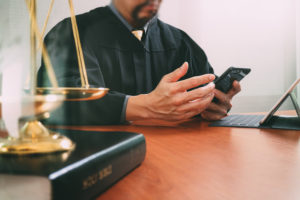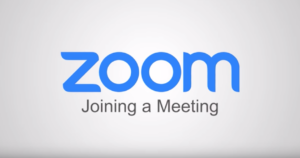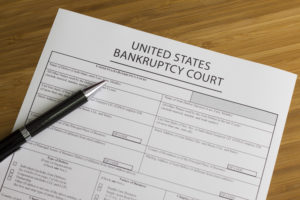Contents
While the COVID-19 pandemic has halted or greatly slowed courtroom proceedings throughout Michigan, the Eastern District of Michigan Federal Bankruptcy Court has been quick to implement procedures to allow the court to function and bankruptcy case to move forward.
MICHIGAN BANKRUPTCY & COVID: ATTORNEYS AND CLIENTS

The Detroit Bankruptcy Court has remained in operation and is conducting hearings remotely by telephone and other electronic means.
Historically, bankruptcy has been one of the last areas of legal practice to prohibit electronic signature of documents to be filed with the Bankruptcy Court.
At least in the Eastern District, the US Trustee and the Court have adhered to a “wet signatures” policy requiring debtors in bankruptcy to have personally signed the bankruptcy petition, schedules, and any other document to be filed with the court in person, with a pen.
The “wet signature” rule is, in theory, good for ensuring that debtors filing for bankruptcy actually know what information is in the petitions that their attorneys draft for them. It is they who will answer questions about that information at the 341 Meeting of Creditors, after all: not the attorneys.
However, it does mean that bankruptcy typically requires an enormous amount of “face-time” between attorneys and clients. This can be good for attorney-client relations—but not so good for anyone in the middle of a pandemic.
Until further announcement of the Court, therefore, the “wet signature” rule has been changed to allow for digital signature via services like DocuSign, which retain a time-stamp of the date and time of signature and other “meta-data,” as well as to allow for application of the electronic signature by the attorney for the debtor with the debtor’s express written permission via email or other means.
“Express” means that the permission must be in writing!
MICHIGAN BANKRUPTCY & COVID: DOCUMENT FILING
The Bankruptcy Court has also ordered that all documents be filed electronically via the Court’s ECF filing system. This is, however, something that all attorneys have already been doing for years.
The rule impacts “pro se” debtors filing without an attorney primarily. It is always advisable to retain an experienced bankruptcy attorney to assist you with your Chapter 7 or Chapter 13 bankruptcy case. Ease of filing is just one of many, many reasons to do so.
MICHIGAN BANKRUPTCY & COVID: COURT HEARINGS
The Court has also ruled that all hearings shall be held telephonically, subject to the orders of each individual judge of the Bankruptcy Court.
Each judge of the Court has more or less ordered in place the same process for conferences and hearings, however. Hearings will be held via telephone, via particular call-in numbers with entry codes.
UPDATE! All Hearings for Bankruptcy Cases filed after September 2023 will be Held by Zoom.
As of September 2023, for all cases filed in the Eastern District of Michigan (Metro Detroit, Flint and Bay City) the .341 Meeting of Creditors will be held by video conference which will be conducted via Zoom.
To Join the meeting go to Zoom.us/join and enter your Trustee’s Meeting ID and Passcode. Trustee Zoom links can be found here: Michigan Trustee Zoom .341 Links

.341 Meetings for all Bankruptcy cases filed after September 2023 will be held by Zoom.
All participants will need an electronic device (computer, laptop, tablet, or smartphone) with a microphone, camera, and internet access, to participate in the Zoom 341 meeting. Instructions on how to connect to a Zoom 341 meeting, including how to download the Zoom application, how to test and connect to a Zoom meeting, and troubleshooting tips, can be found here.
When prompted to enter a name, participants should enter their first and last name, so each participant may be identified properly during the meeting. Participants should join the 341 meeting at least ten (10) minutes before the scheduled start time. Participants should mute their microphones and shut off their video until their case is called. Once the case is called, both the Debtor and the Debtor’s counsel are expected to appear by video.
While the Debtor is sworn in and testifying, the Debtor should be alone, unless the Debtor is appearing from the same location as their attorney, or is a co-Debtor to the case. The Debtor should not communicate with any person regarding the subject of their testimony, by electronic means or otherwise. The Debtor should have readily available a copy of the filed schedules and statement of financial affairs, and any other documents previously requested by and provided to the Trustee.
The Trustee will make an audio recording of the 341 meeting which will constitute the official recording of the 341 meeting. All other recordings, including video or audio recordings of the 341 meeting, are prohibited.
Debtors must submit to the Trustee a copy of their original government-issued photo identification and confirmation of their social security number or individual tax identification number, at least seven (7) days prior to the scheduled 341 meeting of creditors.
The Trustee will not accept personal identifiable information during the meeting. Failure to provide copies of driver’s licenses and social security cards seven (7) days advanced of the meeting will result in the case being adjourned to a later date.
ACCEPTABLE PHOTO IDENTIFICATION DOCUMENTS
- Driver’s license
- US government ID
- State ID
- Student ID
- Passport or current visa, if not a US citizen
- Resident alien card
- Identity card issued by a national government authority
ACCEPTABLE SOCIAL SECURITY NUMBER DOCUMENTS
- Social Security card
- Medical insurance card
- Pay stubs
- W-2 form
- IRS form 1099
- Social Security Administration statement
- ITIN (only if debtor is not eligible for a SSN)
MICHIGAN BANKRUPTCY & COVID: CHAPTER 7 341 MEETINGS
In the typical Chapter 7 bankruptcy proceeding, there is only 1 hearing that a debtor is required to attend: the 341 Meeting of Creditors. Generally, this is a sit-down question-and-answer session held in Detroit, Ann Arbor, Flint, or Bay City, depending upon where your case is filed.
You are placed under oath, your identity is verified by the Chapter 7 Trustee holding the hearing, and you are then required to answer questions that the Trustee or creditors, such as may attend, may have about your income, expenses, debts, and, especially, your assets.
These hearings are now also being held via telephone, or by means established by individual Chapter 7 Trustees. Thus, it is possible that a Chapter 7 Trustee may elect to use a video conferencing application such as Zoom or Skype.
Debtors, their attorneys, and creditors are allowed to call in from separate locations and are not thus required to be face-to-face. However, the debtors’ attorney must verify on the record that they have confirmed their clients’ identities prior to the 341 Meeting via Facetime, Skype, Zoom, or other such means.
Additionally, the profuse documentation supplied by bankruptcy attorneys to Chapter 7 Trustees a week or more prior to the 341 must include sufficient information for the Chapter 7 Trustee to also verify the Social Security Number of the debtor.
Below is the master list of call in phone numbers for the Chapter 7 Trustees in the US Bankruptcy Court for the Eastern District of Michigan. Each Trustee uses the same number every time. Each Trustee wants a copy of the Debtor’s photo ID (Driver’s license or State ID) and Social Security Card uploaded to their respective Trustee software along with the other documents needed for the Bankruptcy Meeting of Creditors (Bankruptcy Code Section.341 Meeting). According to the Trustees, the call quality is best if the attorney and the Debtor call in from separate lines. Some attorneys were apparently calling their clients and then using three-way to call into the meeting, but that makes it hard to hear both the attorney and the Debtor for whatever reason. Debtors should simply call the number and respective code for their Trustee a couple minutes before their scheduled time and be sure to put your phone on mute until you hear your name called. Avoid putting the call on hold as some phone companies have on hold music that will automatically play and disturb the call for all participants. Also be aware that if you take another call while you are waiting for your case to be called, your phone will automatically be on hold when you switch back. As you can see by the list below, some trustees are conducting their creditor meetings via Zoom teleconference. The trustee typically will email the attorney for the debtor a link (Zoom invitation) approximately one week prior to the scheduled hearing date which are then also forwarded to the clients. I invite any of my clients who may be unfamiliar or uncomfortable with the Zoom technology to come into my office to conduct the hearing using my computers and tablets.
|
Chapter 7 Trustee |
Call-In Number | Passcode |
| Corcoran, Collene | 1-877-950-4756 | 4061444 |
| Ellmann, Douglas | 1-866-556-2085 | 4342236 |
| Evangelista, Karen | Zoom teleconference | |
| Frank, Randall | 1-877-951-3988 | 3154946 |
| Gold, Stuart | 1-877-953-2513 | 8850059 |
| Himmelspach, Daniel | 1-877-471-4205 | 9220788 |
| Lewis, Wendy | Zoom teleconference | |
| Lim, K. Jin | 1-866-763-8424 | 6754469 |
| McClarty, Homer | 1-866-600-6490 | 4751649 |
| Miller, Timothy | 1-877-641-6178 | 3839030 |
| Nathan, Kenneth | 1-877-416-0720 | 1551335 |
| Shapiro, Mark | Zoom teleconference | |
| Simon, Basil | 1-866-793-1753 | 6655583 |
| Stevenson, Michael | 1-877-601-5410 | 6620634 |
| Sweet, Samuel | 1-877-784-8090 | 3340904 |

The 341 Meeting of Creditors is the first hearing that you are required to attend after filing a Chapter 7 or Chapter 13 bankruptcy.
IMPORTANT REMINDERS REGARDING REMOTE 341 MEETINGS
- Be sure to KEEP YOUR PHONE ON MUTE until your Trustee calls your case.
- Be sure to CALL FROM A QUIET PLACE as your Trustee must record the hearing.
- Do not call in from your car while driving as this is unsafe distracted driving and your Trustee will likely not conduct your hearing.
- Do not put your phone on hold as oftentimes music plays and disrupts the other hearings.
- Do not use a speakerphone or Bluetooth headset as the Trustees have difficulty hearing or recording the meetings.
- Speak in a clear, loud voice and answer the Trustee’s questions precisely and succinctly. Listen to the question and answer the question. Some people are nervous and sometimes ramble on, without really answering the Trustee’s question. Remember to focus on the question and answer it clearly.
- If your hearing is being held via Zoom, be sure that you name the device that you use to call in with your name and that you have enabled both the audio and the camera as your Trustee will want to see you.
MICHIGAN BANKRUPTCY & COVID: CHAPTER 13 341 MEETINGS & CONFIRMATION HEARINGS
Chapter 13 341 Meetings are also being held remotely. However, whether they are conducted telephonically or virtually via other means depends upon which Chapter 13 Trustee is assigned to your case.
Trustee David Ruskin is holding 341 Meetings telephonically, as is Trustee Tammy L. Terry.
Trustee Krispen Carroll is holding 341 Meetings via Zoom.
All require advance identity verification by debtors’ attorneys. Trustee Carroll requires the submission of a signed form affidavit by the debtors’ attorneys attesting to having identified the debtors properly, prior to the 341.
In a Chapter 13 bankruptcy proceeding, there is at least 1 additional hearing that debtors are customarily required to attend (although not always, depending on the case): the Confirmation Hearing, at which a Chapter 13 Plan proposed by a debtor is either approved by the parties and the Court, or not.
In the Eastern District of Michigan, Confirmation Hearings are usually bifurcated by the Judges into 2 separate courtroom appearances: the morning “status conferences” and, if necessary due to ongoing disagreement by the parties, an after “contested call,” or oral argument before the judge him- or herself.
With regard to the Confirmation Hearings, either morning status conferences or afternoon oral arguments are being heard telephonically pursuant to the individual judges’ orders.
Confirmation Order submission requirements have also been updated to account for the inability for a debtor, objecting creditor, and/or objecting Trustee to agree on terms of Chapter 13 Plan Confirmation on the spot at a face-to-face status conference. Proposed Confirmation Orders are now to be submitted by 4:30 PM the day after the hearing.
If your Chapter 13 Confirmation is “fast-tracked” (confirmed by stipulated agreement of the parties prior to the Confirmation Hearing), as before, there is no need for a Confirmation Hearing.
MICHIGAN BANKRUPTCY & COVID-19: THE BOTTOM LINE
The bottom line is that, if you are considering filing for bankruptcy, it pays to retain a bankruptcy attorney to assist you in dealing with these procedural changes. It was difficult to navigate the differing judges’ and Trustees’ various requirements and process preferences before. Now, it can be downright confusing.
The Law Offices of Walter A. Metzen & Associates offers free consultations for those interested in the bankruptcy process and is experienced in determining and advising as to the best course of action when filing Chapter 7 or Chapter 13.




